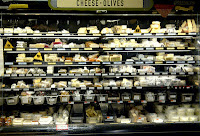As broken as much ofour modern industrial food system is, consumers still wield the ultimate power:We can vote with our forks. Eventually, the message gets across. Witness thegrowth of all things organic…No laws decreed that farmers produce more organicfood, but thanks to consumer demand, it’s the fastest growing segment of thegrocery industry. No laws forbade farmers from administering rBGH to cows.Shoppers just wouldn’t buy the stuff. – BarryEstabrook for The Atlantic, February 27,2012
| Murray’s Organic Chicken |
Food, Inc. was rightwhen it said that everyone has the power to change the food productionlandscape because we are able to vote at least three times a day, but thisdoesn’t mean that I knew it before I saw that documentary.
Before my eyes were opened to that fact, I was pretty sure Iwas limited to the system of the American supermarket I was introduced to in2002 when I moved her from Asia. Tomatoes wereenormous, radiated, chilled and went from a light orange to rotten without ever turning red. There weren’t many varieties of cheese and milk. Organic foodbelonged to an aisle I avoided because everything in that section just seemedunrealistically expensive, and definitely out of reach.
 |
| Organic Cheese Section |
When I learned from the documentary and more of Michael Pollan’s sentiments that there areactually options, I began to make more informed choices for my meals and eatinghabits. I realized that the purchase ofGMOs and feedlot meats had a direct impact on social issues including those Icared particularly for, like immigrant rights. I also learned that I didn’thave to be a tree-hugging vegan to make sustainable decisions when it comes tomy food choices.
I began to try organic produce. I started to start cookingdishes heavier on vegetables rather than mainly starring meat. When buying meat, Itried to buy the organic, antibiotic- and hormone-free varieties. I boughtfree-range chickens and eggs. I stopped shopping at the regular grocery storeand instead make majority of my purchases from an establishment that doesn’teven carry feedlot meat, GMOs, or non-organic produce. I realized eating betterwasn’t so out of reach after all. And I discovered that unadulterated food actually tastes better!
I am sure I am not alone in this. Lately my neighborhoodbodega has started to carry organic products and a whole line of free-rangeeggs, organic milk and cheese. People have started to change the market in away that affects production practices and lowers costs. Murray’s chicken, a favorite organicfree-range chicken once only sold in specialty stores such as Whole Foods or the Food Coop, has found its way to Trader Joe’s and now even the veryconventional Key Food. Could it be thatpeople just aren’t buying feedlot chickens anymore? Prices have also gone down.
It makes me happy that regular consumers like me canactually battle large food industries with our everyday decisions. It makes mefeel optimistic that things might actually change in a way that positivelyimpacts society and the environment. When it comes to changing how ourfood is made, one doesn’t even need to be an activist – just an eater makingbetter choices.
All text and photos by DopamineJunkie.org unless otherwise indicated. ©2012 DopamineJunkie.org
